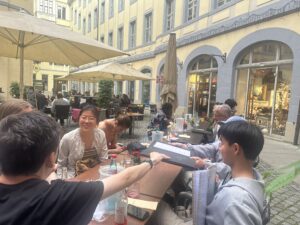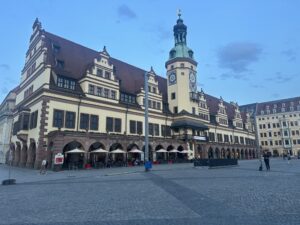It has been wonderful reading all of your reflections on Leipzig. I thought I might add a few of my own. First of all, while I had hoped that this would be a good course and a successful trip, I had entirely underestimated how wonderful this experience might be. As many of may have gleaned, I have a complicated relationship with the music of Bach. On the one hand, my experiences singing Bach choral music in high school had a profound influence on my life. I think it’s fair to say that I might not have pursued music professionally as either a singer or scholar had I not, on the first day in the Classical High School Choir, found a score of the Bach Magnificat on my desk. I sang Bach during my conservatory years and learned some arias; but this was during a time in Boston when very rigid notions about early music singing were taking hold, and—even when I was young—I didn’t sound quite enough like a boy soprano! When I went to graduate school, I had the privilege of studying with two amazing Bach scholars, Robert Marshall (whose essay you read) and Eric Chafe (who writes a lot about tonality and theology in Bach). But then I discovered that — particularly in the 90s—the Bach scholarly world was very much a masculine realm. And I blissfully went off to study seventeenth-century opera in Venice—another great city, to be sure! I didn’t come back to Bach, as it were, until I was commissioned to write the book on Music in the Baroque (I began that around 2008 or 2009) and spent a lot of time thinking about what role Bach plays in a textbook in baroque music. I bristled against the notion that we treat all the other composers of the baroque as mere “predecessors” of the great masters. Should he have his own chapter? How do we lead up to Bach without devaluing the other composers? What about Telemann, who was arguably far more successful by many metrics than Bach? Most textbooks spend time on the Vivaldi concertos that were models for Bach, as it will certainly help students better understand the Brandenburg Concertos. I became interested in the Vivaldi concertos that were much less conventional, such as the one for Viola d’amore and lute: https://www.youtube.com/watch?v=uXTMeNF-Pf8
In the end, I was reasonably happy devoting a chapter to Handel and Bach, underscoring, as much as possible, some of the complexities in the way that Bach was represented by scholars while also conveying something of my passion for the music.
While I was still finishing the book, I was asked to be a keynote speaker for a conference at Yale on “Bach and Women.” I nearly turned it down, but Ruth Tatlow persuaded me that I was the right person to do it—though I’d never published anything much on Bach at that point, beyond program notes at Princeton. With her encouragement, I published an essay on Bach’s Magnificat (that she edited) and then was asked to write an essay on Bach and women that I posted on canvas, published a few years ago. And that resulted in an invitation to speak at the Emmanuel Institution at Emmanuel Church in Boston. (For those of you who don’t know about Emmanuel Church, they perform a Bach cantata every week for their service! ). And while I’ve spoken at some Bach conferences over the years—in no small part because of Ruth Tatlow’s encouragement—I always feel like an outsider.
So that brings us to our trip to Leipzig. I was excited about the possibility of doing this course—and thrilled at the prospect of hearing all the wonderful concerts—but I truly had no idea what to expect. What I found, however, is that in introducing all of you to Bach in the classroom, at the archive with Peter, in concerts, and in our own performance, I felt much closer to Bach again, regaining something of the unmitigated passion that I had felt in high school. This was truly a gift, and I am grateful to you all! If indeed I do get to write a book on Bach (which I’m contemplating, but it will have to wait a few years), each of you will be listed in the acknowledgements.
Thank you!

